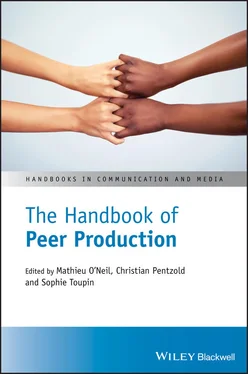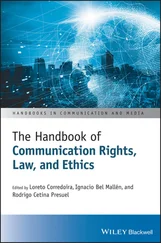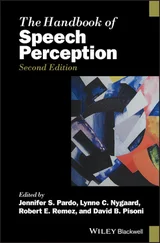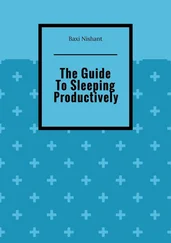20 Bruns, A. (2008). Blogs, Wikipedia, Second Life, and beyond: From production to produsage. New York, NY: Peter Lang.
21 Cohen, J. (2019). Between truth and power: The legal constructions of informational capitalism. New York, NY: Oxford University Press.
22 Coleman, E. (2012). Coding freedom: The ethics and aesthetics of hacking. Princeton, NJ: Princeton University Press.
23 Coriat, B. (2011). From Natural‐Resource Commons to Knowledge Commons: Common Traits and Differences, LEM Papers Series 2011/16, Laboratory of Economics and Management (LEM), Sant’ Anna School of Advanced Studies, Pisa, Italy.
24 Dafermos, G. (2012). Authority in peer production: The emergence of governance in the FreeBSD project. Journal of Peer Production, 1, 1–22. Retrieved from http://peerproduction.net/issues/issue‐1/peer‐reviewed‐papers/
25 Dalla Costa, M., & James, S. (1972). The power of women and the subversion of the community. Bristol: Falling Wall Press.
26 De Angelis, M., & Harvie, D. (2014). The commons. In M. Parker, G. Cheney, V. Fournier, & C. Land (Eds.), The Routledge companion to alternative organizations (pp. 280–294). Abingdon: Routledge.
27 Delfanti, A., & Söderberg, J. (2018). Repurposing the hacker: Three cycles of recuperation in the evolution of hacking and capitalism. Ephemera, 18(3), 457–476.
28 Descy, D. (2006). The wiki: True web democracy, TechTrends, 50(1), 4–5.
29 Eghbal, N. (2016). Roads and bridges: The unseen labor behind our digital infrastructure. New York, NY: Ford Foundation.
30 Euler, J. (2016). Commons‐creating society: On the radical German commons discourse. Review of Radical Political Economics, 48(1), 93–110.
31 Fisher, E. (2010). Contemporary technology discourse and the legitimation of capitalism. European Journal of Social Theory, 13, 229–252.
32 Frayssé, O., & O’Neil, M. (2015). Hacked in the USA: Prosumption in the digital age. In M. Frayssé & M. O’Neil (Eds.), Digital labour and prosumer capitalism (pp. 1–20). Basingstoke: Palgrave Macmillan.
33 Freeman, J. (1972). The tyranny of structurelessness. The Second Wave. Retrieved from http://struggle.ws/hist_texts/structurelessness.html
34 González‐Barahona, J. M., & Robles, G. (2013). Trends in free, libre, open source software communities: From volunteers to companies. Information Technology, 55(5), 179–180.
35 Haruvy, E., Prasad, A., & Sethi, S. P. (2003). Harvesting altruism in open‐source software development. Journal of Optimization Theory and Applications, 118, 381–416.
36 Hoffman, P., & S. Harris. (2009). The Tao of the IETF: a novice’s guide to the Internet Engineering Task Force, RFC 4677, 30 November 2009. Retrieved from www.ietf.org/tao.html
37 Holloway, T., Bozicevic, M., & Börner, K. (2007). Analyzing and visualizing the semantic coverage of Wikipedia and its authors. Complexity, 12(3), 30–40.
38 James, C. L. R. ([1938]1989). The Black Jacobins: Toussaint l’Ouverture and the San Domingo revolution. New York: Vintage.
39 Jarrett, K. (2016). Feminism, labour and digital media: The digital housewife. New York: Routledge.
40 Jarrett, K. (2019). Through the reproductive lens: Labour and struggle at the intersection of culture and economy. In D. Chandler & C. Fuchs (Eds.), Digital objects digital subjects: Interdisciplinary perspectives on capitalism, labour and politics in the age of big data (pp. 103–116). London: University of Westminster Press.
41 Jasanoff, S., & Kim, S. (Eds.). (2016). Dreamscapes of modernity: Sociotechnical imaginaries and the fabrication of power. Chicago: University of Chicago Press.
42 Jørgensen, N. (2007). Developer autonomy in the FreeBSD Open Source project. Journal of Management & Governance, 11(2), 119–128.
43 Joyce, E. J., Pike, C., & Butler, B. S. (2013). Rules and roles vs. consensus: Self‐governed deliberative mass collaboration bureaucracies. American Behavioral Scientist, 57, 576–594.
44 Kaufman, A. S. (1969). Human nature and participatory democracy: Ten years later. In W. E. Connolly (Ed.), The bias of pluralism (pp. 178–200). New York, NY: Atherton Press.
45 Kelty, C. M. (2008). Two bits: The cultural significance of free software. Durham, NC: Duke University Press.
46 Konieczny, P. (2010). Adhocratic governance in the Internet age: A case of Wikipedia, Journal of Information Technology & Politics, 7(4), 263–283.
47 Kreiss D., Finn, M., & Turner, F. (2011). The limits of peer production: Some reminders from Max Weber for the network society. New Media & Society, 13, 243–259.
48 Larkin, B. (2013). The politics and poetics of infrastructure. Annual Review of Anthropology, 42(1), 327–343.
49 Lee, G., & Cole, R. (2003). From a firm‐based to a community‐based model of knowledge creation: The case of the Linux kernel development. Organization Science, 14(6), 633–649.
50 Lerner J., & Tirole, J. (2002). Some simple economics of open source. The Journal of Industrial Economics, 50(2), 197–234.
51 Lessig, L. (2008). Remix: Making art and commerce thrive in the hybrid economy, New York, NY: Penguin.
52 Levy, S. ([1984]2010). Hackers: Heroes of the computer revolution. Newton: O’Reilly Media.
53 Lund, A., & Zukerfeld, M. (2020). Corporate capitalism’s use of openness. Basingstoke: Palgrave Macmillan.
54 Mansell, R., & Berdou, E. (2010). Political economy, the Internet and FL/OSS development. In J. Hunsinger, M. Allen, & L. Klastrup (Eds.), International handbook of internet research (pp. 341–362). Dordrecht: Springer.
55 Mason, P. (2015). Postcapitalism: A guide to our future. London: Allen Lane.
56 Meretz, S. (2012). Ten patterns developed by the Oekonux movement. Journal of Peer Production, 1. Retrieved from http://peerproduction.net/issues/issue‐1/debate‐societal‐transformation/ten‐patterns‐developed‐by‐the‐oekonux‐project/
57 Merton, R. K. (1942). The normative structure of science. In R. K. Merton, The sociology of science: Theoretical and empirical investigations (pp. 267–280). Chicago: University of Chicago Press.
58 Mindel, V., Mathiassen, L., & Rai, A. (2018). The sustainability of polycentric information commons. MIS Quarterly, 42(2), 607–632.
59 Musil, S. (2019, September 16). Computer scientist Richard Stallman resigns from MIT after Jeffrey Epstein comments. CNET. Retrieved from https://www.cnet.com/news/computer‐scientist‐richard‐stallman‐resigns‐from‐mit‐after‐jeffrey‐epstein‐comments/
60 Noble, S. (2018). Algorithms of oppression: How search engines reinforce racism. New York: New York University Press.
61 O’Mahony, S., & Ferraro, F. (2007). The emergence of governance in an open source community. Academy of Management Journal, 50, 1079–1106.
62 O’Neil, M. (2009). Cyberchiefs. Autonomy and authority in online tribes. London: Pluto Press.
63 O’Neil, M. (2014). Hacking Weber: Legitimacy, critique and trust in peer production. Information, Communication & Society, 17(7), 872–888.
64 O’Neil, M. (2015). Labour out of control. The political economy of capitalist and ethical organizations. Organization Studies, 36(12), 1627–1647.
65 O’Neil, M., Muselli, L., Raissi, M., & Zacchiroli, S. (2020a). “Open source has won and lost the war”: Justifying commercial‐communal hybridization in a FOSS project. New Media & Society. https://doi.org/10.1177/1461444820907022.
66 O’Neil, M., Muselli, L., Cai, X., & Zacchiroli, S. (2020b). Mapping open source capitalism: The firm‐volunteer project co‐production network and its media representation. ASA Annual Meeting, San Francisco, CA.
67 O’Neil, M., Muselli, L., Cai, X., Pailler, F., & Zacchiroli, S. (2020c). Firm discourses and digital infrastructure projects. AOIR, Dublin.
Читать дальше


![О Генри - Справочник Гименея [The Handbook of Hymen]](/books/407356/o-genri-spravochnik-gimeneya-the-handbook-of-hymen-thumb.webp)









